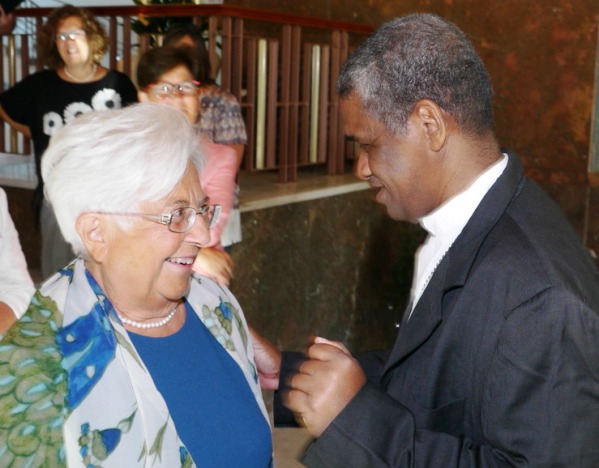
Aug 16, 2016 | Focolare Worldwide
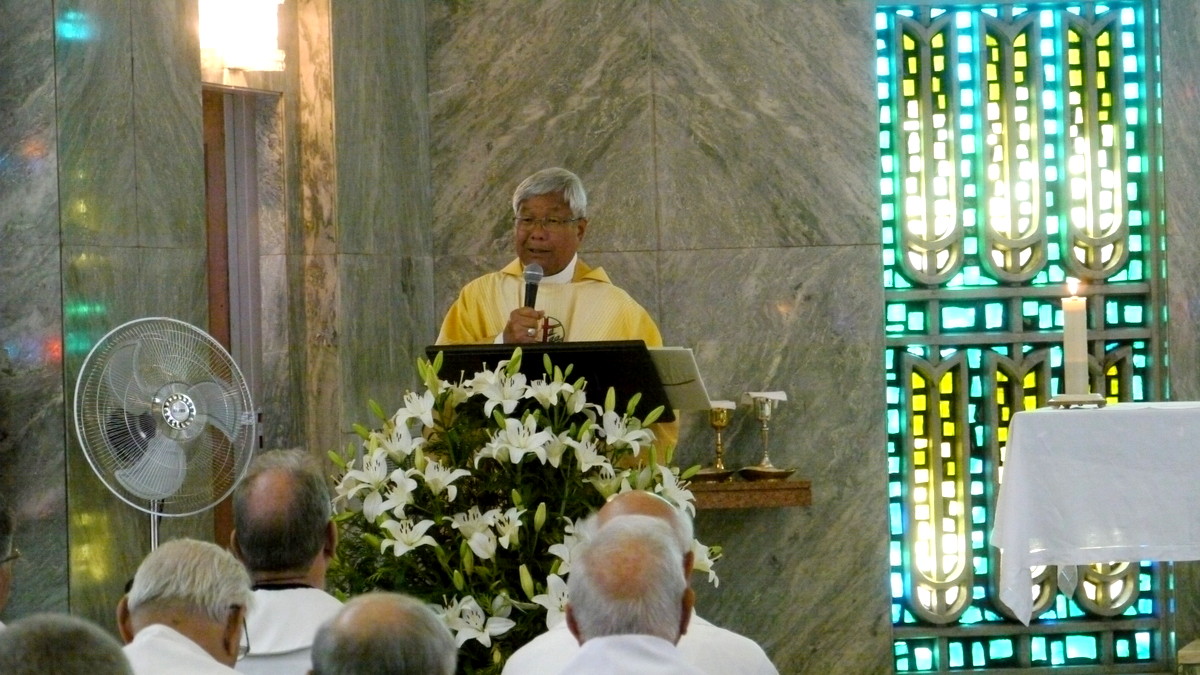 Every summer bishops from around the world gather for a preriod of rest and sharing of their lives while reflecting on being a Church that is instrument and sign of unity in the great variety of settings of the global society that is marked by so many tensions and contradictions. This year they met in Braga, Portugal. “In the Church today it is the moment of unity and communion, the moment when we are being invited to have a collective experience of God. We’re not here only because we’re each bishops, but because we’re brothers. We’d like to be a body of brothers like the first Apostles with Jesus.” These words were spoken by Cardinal João Bráz de Aviz during their Mass inside the Chapel of Apparitions as the 67 bishops from 27 countries made a pilgrimage to Fatima on August 4th.
Every summer bishops from around the world gather for a preriod of rest and sharing of their lives while reflecting on being a Church that is instrument and sign of unity in the great variety of settings of the global society that is marked by so many tensions and contradictions. This year they met in Braga, Portugal. “In the Church today it is the moment of unity and communion, the moment when we are being invited to have a collective experience of God. We’re not here only because we’re each bishops, but because we’re brothers. We’d like to be a body of brothers like the first Apostles with Jesus.” These words were spoken by Cardinal João Bráz de Aviz during their Mass inside the Chapel of Apparitions as the 67 bishops from 27 countries made a pilgrimage to Fatima on August 4th. 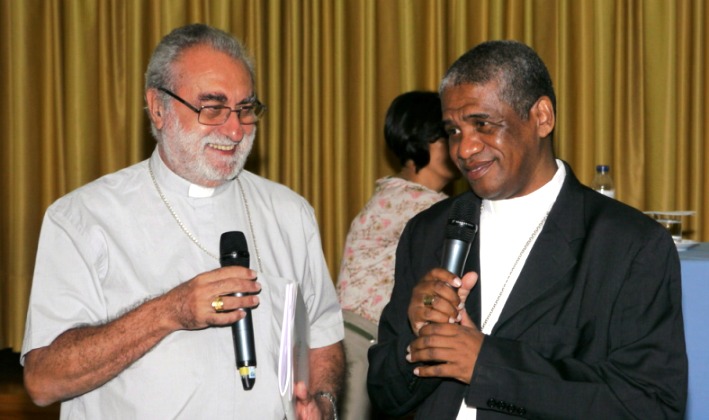 At the conclusion of the gathering Cardinal Francis Xavier Kriengsak Kovithavanij, Archbishop of Bangkok, Thailand summarized their experience in the following way: “We were really happy during these days. We’ve lived like brothers. We felt free and able to open our hearts to one another. Our only Teacher was truly among us. We felt that we were living in the house of Mary.” The bishops were welcomed at Mater Ecclesia Apostolic Centre near the Shrine of Our Lady of Sameiro, by Dom Jorge Ortiga, Archbishop of Braga. It was an appropriate setting for reflecting on the current world scene with international political expert Pasquale Ferrara, and the reform of the Church in the wake of Pope Francis with theologian Piero Coda. It was against this background that the bishops questioned themselves on how to be bishops with a synodal approach and put into practice a culture of shepherding that is marked by communion.
At the conclusion of the gathering Cardinal Francis Xavier Kriengsak Kovithavanij, Archbishop of Bangkok, Thailand summarized their experience in the following way: “We were really happy during these days. We’ve lived like brothers. We felt free and able to open our hearts to one another. Our only Teacher was truly among us. We felt that we were living in the house of Mary.” The bishops were welcomed at Mater Ecclesia Apostolic Centre near the Shrine of Our Lady of Sameiro, by Dom Jorge Ortiga, Archbishop of Braga. It was an appropriate setting for reflecting on the current world scene with international political expert Pasquale Ferrara, and the reform of the Church in the wake of Pope Francis with theologian Piero Coda. It was against this background that the bishops questioned themselves on how to be bishops with a synodal approach and put into practice a culture of shepherding that is marked by communion. 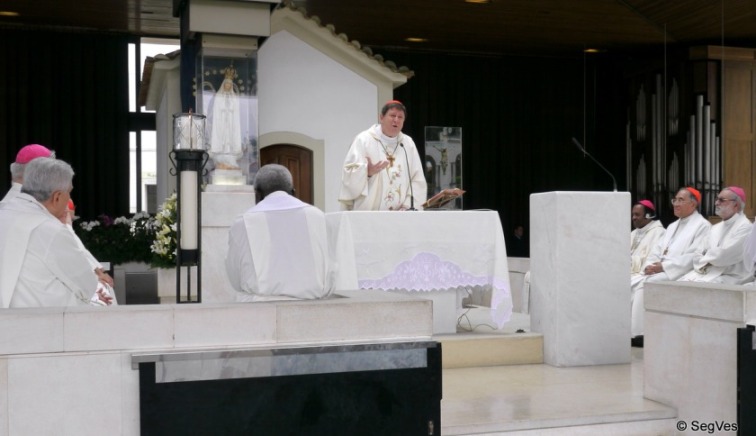 Plenary and small group meetings, walks and meals together were all opportunities to put in common painful situations and signs of hope: the anguished cry that rises from the Church in the Middle East; the growth of fruitful integration between basic ecclesial communities and new Movements and Communities in a large diocese of Brazil that offers a significant example of the Letter Iuvenescit Ecclesia (The Church that Rejuvinates), which was published in June by the Congregation for the Doctrine of the Faith; the challenges and potential of inculturation in a pluralistic context like India; the fruits that can come forth when a bishop and his auxiliaries live the common life and when a bishop manages to make himself a brother and friend of his priests; the arduous task of evangelization in a place like Madagascar that is marked by poverty.
Plenary and small group meetings, walks and meals together were all opportunities to put in common painful situations and signs of hope: the anguished cry that rises from the Church in the Middle East; the growth of fruitful integration between basic ecclesial communities and new Movements and Communities in a large diocese of Brazil that offers a significant example of the Letter Iuvenescit Ecclesia (The Church that Rejuvinates), which was published in June by the Congregation for the Doctrine of the Faith; the challenges and potential of inculturation in a pluralistic context like India; the fruits that can come forth when a bishop and his auxiliaries live the common life and when a bishop manages to make himself a brother and friend of his priests; the arduous task of evangelization in a place like Madagascar that is marked by poverty.  The two-day visit by bishops from other Churches – two Lutherans and one Syro-Orthodox – and an afternnon meeting with seven bishops from Portugal was mutually enriching. The spiritual part of the meeting had two main themes: Christ Crucified, which is one of the carindal points of the spirituality of unity; and love for the Church. These were presented in talks by Focolare president, Maria Voce (Jesus Forsaken, God’s Window & Humanity’s Window); and by co-president Jesús Morán (The Ecclesial Genius of Chiara Lubich and the Charism of Unity).
The two-day visit by bishops from other Churches – two Lutherans and one Syro-Orthodox – and an afternnon meeting with seven bishops from Portugal was mutually enriching. The spiritual part of the meeting had two main themes: Christ Crucified, which is one of the carindal points of the spirituality of unity; and love for the Church. These were presented in talks by Focolare president, Maria Voce (Jesus Forsaken, God’s Window & Humanity’s Window); and by co-president Jesús Morán (The Ecclesial Genius of Chiara Lubich and the Charism of Unity).
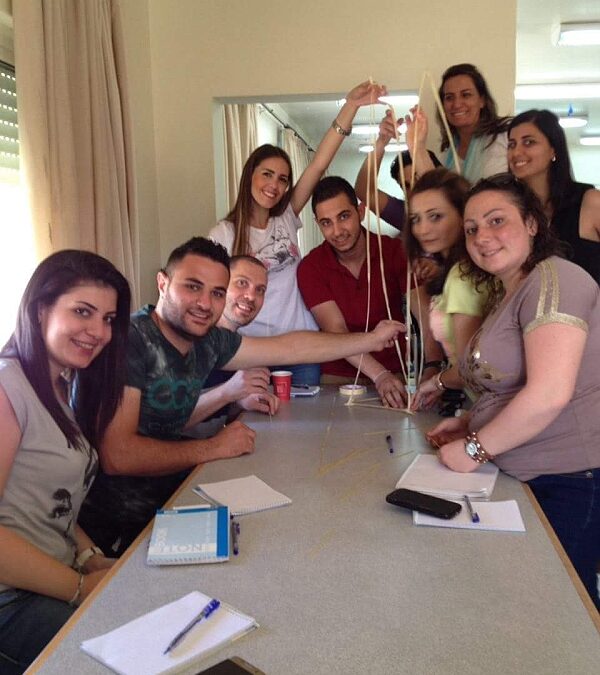
Aug 12, 2016 | Focolare Worldwide
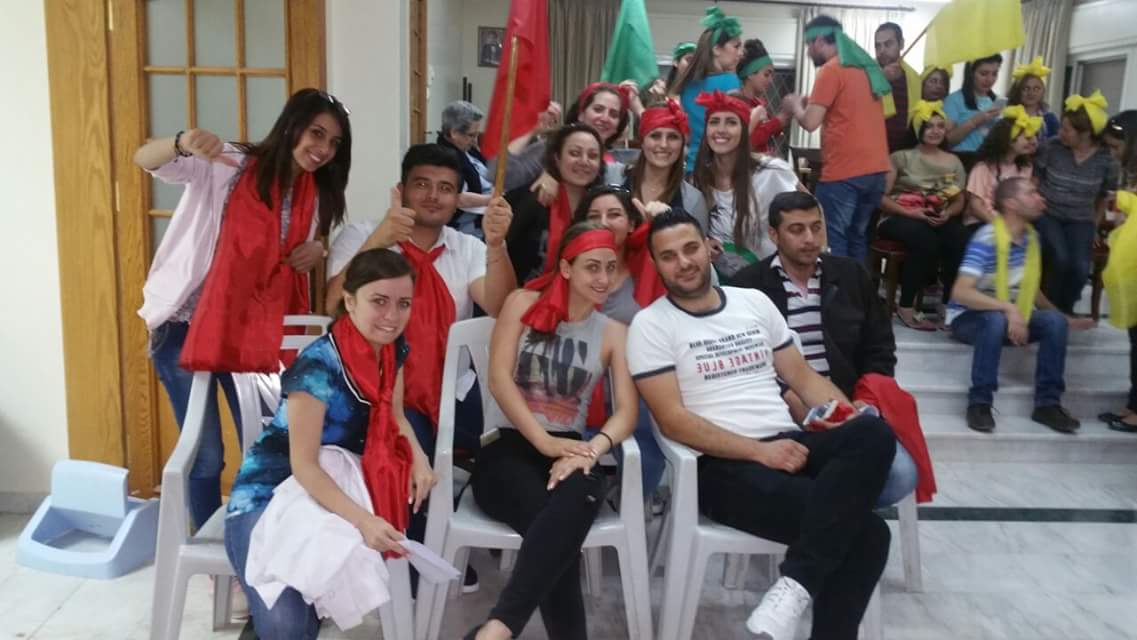 “I learned to transform the negative into positive and transmit it to my friends and not to despair in the face of difficulties.” Said in a context like that of Syria, where the young people live “under continuous psychological pressure” each word weighs differently. “Sad to say, there is continuous news from Syria about civilian war victims, especially in Aleppo,” Pope Francis reminded all once again in the Angelus of 7 August. He continued saying “It is unacceptable that many innocent people – and many children – have to pay the price of the conflict, which is that of closed hearts and the lack of will of those in power.” He then urged all to take everything to heart and personally support the Syrian brothers and sisters with their prayers and solidarity. War is stressful even if there are seeds of hope, and it is what we must continue to focus on. “We felt that we had to do something different with the youth, to support them from the spiritual and human standpoint,” recounted Lina Morcosand Murad Al Shawareb, educators of the Focolare Movement, «and this is why we thought of inviting Sr Noha Daccache, Lebanese, of the Sacred Heart, and university professor specialising in social sciences. We chose to deepen, in this year of mercy, the concept of “Mercy and prayer in our daily lives.”
“I learned to transform the negative into positive and transmit it to my friends and not to despair in the face of difficulties.” Said in a context like that of Syria, where the young people live “under continuous psychological pressure” each word weighs differently. “Sad to say, there is continuous news from Syria about civilian war victims, especially in Aleppo,” Pope Francis reminded all once again in the Angelus of 7 August. He continued saying “It is unacceptable that many innocent people – and many children – have to pay the price of the conflict, which is that of closed hearts and the lack of will of those in power.” He then urged all to take everything to heart and personally support the Syrian brothers and sisters with their prayers and solidarity. War is stressful even if there are seeds of hope, and it is what we must continue to focus on. “We felt that we had to do something different with the youth, to support them from the spiritual and human standpoint,” recounted Lina Morcosand Murad Al Shawareb, educators of the Focolare Movement, «and this is why we thought of inviting Sr Noha Daccache, Lebanese, of the Sacred Heart, and university professor specialising in social sciences. We chose to deepen, in this year of mercy, the concept of “Mercy and prayer in our daily lives.” 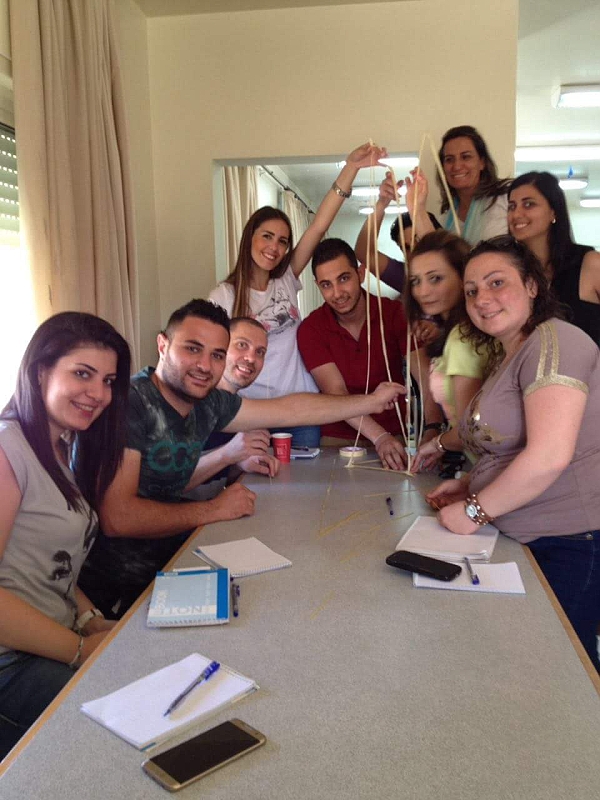 “Already during the preparations – through the iPhone application WhatsApp – there was a great sense of maturity,” seen also during the three-day event (from 10 to 12 June). Sr Noha’s reflections on mercy and prayer, and the Sacred Scriptures also seen in relation to their spiritual lives, triggered questions and reflections. “But on the first day we realised that we were all stressed out due to the situation we were undergoing. So we first held a dialogue session, after which someone suggested a moment of prayer. It was a moving moment with songs and meditations, where the youth said spontaneous prayers and with faith, asked for the gift of Peace.” “On the second day, we delved deeper into the various aspects of life that hindered us from fully corresponding to what God asks of us each day. On the last day instead, Chiara Lubich’s article, ‘Better than yesterday’, was really enlightening since it gave us a concrete key to always love Jesus better.” A girl wrote, “I understood that I had to live the present moment solemnly, to offer the pain and live it for Jesus; all the rest is secondary. While praying I felt that Jesus was saying to me: I am with you.” As she was leaving, Sr Caccache said “You people are really outstanding – I shall keep you in my heart and pray intensely for Peace.” Maria Chiara De Lorenzo
“Already during the preparations – through the iPhone application WhatsApp – there was a great sense of maturity,” seen also during the three-day event (from 10 to 12 June). Sr Noha’s reflections on mercy and prayer, and the Sacred Scriptures also seen in relation to their spiritual lives, triggered questions and reflections. “But on the first day we realised that we were all stressed out due to the situation we were undergoing. So we first held a dialogue session, after which someone suggested a moment of prayer. It was a moving moment with songs and meditations, where the youth said spontaneous prayers and with faith, asked for the gift of Peace.” “On the second day, we delved deeper into the various aspects of life that hindered us from fully corresponding to what God asks of us each day. On the last day instead, Chiara Lubich’s article, ‘Better than yesterday’, was really enlightening since it gave us a concrete key to always love Jesus better.” A girl wrote, “I understood that I had to live the present moment solemnly, to offer the pain and live it for Jesus; all the rest is secondary. While praying I felt that Jesus was saying to me: I am with you.” As she was leaving, Sr Caccache said “You people are really outstanding – I shall keep you in my heart and pray intensely for Peace.” Maria Chiara De Lorenzo
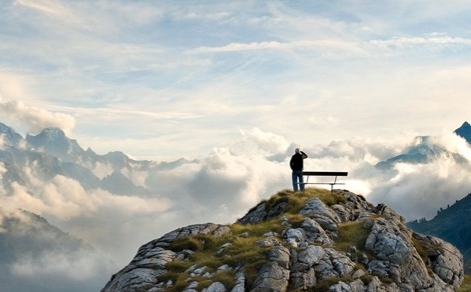
Aug 8, 2016 | Focolare Worldwide, Senza categoria
 “No one in my family knew the Focolare, and I remember that the only reason why I attended the weekly Saturday appointments where we delved into the life of the Gospel was that I felt loved without conditions. I was born and raised in Ascoli Piceno, in the Marche region of Italy. Every year I attended religious education classes for young people, which established me on my faith journey. When I was 19 I had to face knee surgery that resulted in several complications. While I was still in hospital the doctors told me that I’d no longer be able to play volleyball and that I wouldn’t have the full use of my leg. Right then, I understood what it meant to say that ‘God is the ideal that never crumbles’ and I firmly decided for God. If I couldn’t play any kind of sport anymore, God would certainly find something else for me to do. After high school I began university, but went back every Saturday to help out at the parish, setting up games for teens and young people. Even though I couldn’t play, I found out how much fun it can be to help others play, getting them to perform some feats that were truly acrobatic! Throughout those years I became aware of God’s powerful call in my heart, to to spend my whole life for Him in others. At the 2007 Mariapolis, after receiving Jesus in the Holy Eucharist, I felt in my heart what my path in life might be: to bring the charism of unity into my diocese. It was an absolute decision for God in favour of something quite precise. This plunge in God led me to live life to the full, in the fullness of joy, and it allowed me to face a situation that on the human level I would never have been able to face. In 2010, I began to have new problems with my leg that had been through surgery, then the other leg, my back, and, in a matter of few months it was an effort for me to walk and stand on my feet. The doctors couldn’t come up with an explanations and since I was close to finishing my diploma, they hypothesized that it was some sort of nervous condition or form of depression. In my heart I continued to feel a joy that came from living the same ideal together with my friends in the Focolare and couldn’t understand what was going on. One night, I escaped to a church and prayed in front of Eucharistic Jesus: “If it enters into your will for me to begin these medical treatments, give me a sign. If, instead, I have some sort of strange ailment, let me know, because I would like to go on being a gift for the others.” That very treatment revealed a rare genetic illness that was causing all the problems I was experiencing and that continues to cause the chronic pain that I constantly live with. At first my mind was invaded by questions and despair. How would I be able to live for others? I realized that God’s Love didn’t change in front of the pain, perhaps I understood it in a different way, but His love always remained immense, endless. What should I do then? What could I do? I would carry on loving and building unity with everyone around me, even if it required more effort now, even if I felt like I’d rather be left alone. A few months later I was asked to take on a group of small boys. I wondered: will I be able to do it? I put aside my fears and decided to place myself at the service of others. Today, I have to say that over these years, the kids in that group were my strength and courage. Because, by loving, you can overcome anything. So many times I felt like I wouldn’t be physically able to hold up, but I did. I saw for myself that ‘Nothing is impossible for God’.”
“No one in my family knew the Focolare, and I remember that the only reason why I attended the weekly Saturday appointments where we delved into the life of the Gospel was that I felt loved without conditions. I was born and raised in Ascoli Piceno, in the Marche region of Italy. Every year I attended religious education classes for young people, which established me on my faith journey. When I was 19 I had to face knee surgery that resulted in several complications. While I was still in hospital the doctors told me that I’d no longer be able to play volleyball and that I wouldn’t have the full use of my leg. Right then, I understood what it meant to say that ‘God is the ideal that never crumbles’ and I firmly decided for God. If I couldn’t play any kind of sport anymore, God would certainly find something else for me to do. After high school I began university, but went back every Saturday to help out at the parish, setting up games for teens and young people. Even though I couldn’t play, I found out how much fun it can be to help others play, getting them to perform some feats that were truly acrobatic! Throughout those years I became aware of God’s powerful call in my heart, to to spend my whole life for Him in others. At the 2007 Mariapolis, after receiving Jesus in the Holy Eucharist, I felt in my heart what my path in life might be: to bring the charism of unity into my diocese. It was an absolute decision for God in favour of something quite precise. This plunge in God led me to live life to the full, in the fullness of joy, and it allowed me to face a situation that on the human level I would never have been able to face. In 2010, I began to have new problems with my leg that had been through surgery, then the other leg, my back, and, in a matter of few months it was an effort for me to walk and stand on my feet. The doctors couldn’t come up with an explanations and since I was close to finishing my diploma, they hypothesized that it was some sort of nervous condition or form of depression. In my heart I continued to feel a joy that came from living the same ideal together with my friends in the Focolare and couldn’t understand what was going on. One night, I escaped to a church and prayed in front of Eucharistic Jesus: “If it enters into your will for me to begin these medical treatments, give me a sign. If, instead, I have some sort of strange ailment, let me know, because I would like to go on being a gift for the others.” That very treatment revealed a rare genetic illness that was causing all the problems I was experiencing and that continues to cause the chronic pain that I constantly live with. At first my mind was invaded by questions and despair. How would I be able to live for others? I realized that God’s Love didn’t change in front of the pain, perhaps I understood it in a different way, but His love always remained immense, endless. What should I do then? What could I do? I would carry on loving and building unity with everyone around me, even if it required more effort now, even if I felt like I’d rather be left alone. A few months later I was asked to take on a group of small boys. I wondered: will I be able to do it? I put aside my fears and decided to place myself at the service of others. Today, I have to say that over these years, the kids in that group were my strength and courage. Because, by loving, you can overcome anything. So many times I felt like I wouldn’t be physically able to hold up, but I did. I saw for myself that ‘Nothing is impossible for God’.”
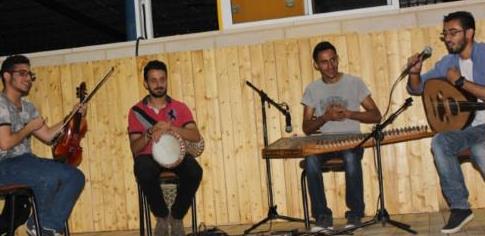
Aug 4, 2016 | Focolare Worldwide, Senza categoria
 «These have been wonderful days, I found peace and security. The group dialogues were rich, especially those of the families.» «I thank God for the grace we have received also as a couple. There were some issues between the two of us, but here, many things changed. Now we are happy and ready to commit ourselves to any type of activities.» « For the first time I helped out with the children: a very special experience. From them I learned simplicity and how to live love in daily life.» «I felt that I had to accept the others as they are. I have refilled and am ready to go forward!» These are some impressions, among many that have come up during these months throughout the world where the Mariapolis is being held, the typical summer gatherings of the Focolare. All as usual up to this point. Except for the fact that these impressions were gathered in the troubled Holy Land. «Our Mariapolis – they wrote from Jerusalem – was held from 30 June to 2 July, in Jenin, Palestine. A beautiful and welcoming place which helped us to relax, and deepen that golden thread of the programme which invited us to put into practise the mercy of God and with our brothers. 230 people from various localities participated. It was the first time for many of them among whom were young people, kids and children. Also about 20 people from the Gaza Strip participated, and to do so were able to obtain the permit to leave.» «Among the illustrious guests was the Melkite Catholic Archbishop of Galilee , Bishop Georges Bacaouni, whose words – one of the participants said – were a great enlightenment since they encouraged all to live in such a way as to show all that we love Jesus.»
«These have been wonderful days, I found peace and security. The group dialogues were rich, especially those of the families.» «I thank God for the grace we have received also as a couple. There were some issues between the two of us, but here, many things changed. Now we are happy and ready to commit ourselves to any type of activities.» « For the first time I helped out with the children: a very special experience. From them I learned simplicity and how to live love in daily life.» «I felt that I had to accept the others as they are. I have refilled and am ready to go forward!» These are some impressions, among many that have come up during these months throughout the world where the Mariapolis is being held, the typical summer gatherings of the Focolare. All as usual up to this point. Except for the fact that these impressions were gathered in the troubled Holy Land. «Our Mariapolis – they wrote from Jerusalem – was held from 30 June to 2 July, in Jenin, Palestine. A beautiful and welcoming place which helped us to relax, and deepen that golden thread of the programme which invited us to put into practise the mercy of God and with our brothers. 230 people from various localities participated. It was the first time for many of them among whom were young people, kids and children. Also about 20 people from the Gaza Strip participated, and to do so were able to obtain the permit to leave.» «Among the illustrious guests was the Melkite Catholic Archbishop of Galilee , Bishop Georges Bacaouni, whose words – one of the participants said – were a great enlightenment since they encouraged all to live in such a way as to show all that we love Jesus.»  «Since this is the Year of Mercy, also a moment of the programme was dedicated to what we called a “face to face with God” moment. After a deep examination of conscience, before Jesus in the Eucharist, each one of us wrote the steps we felt we could take to grow in love towards God and towards the others, and to then burn the piece of paper in a great fire, and symbol of the mercy of God. After this solemn moment, a lady from Gaza confided with great joy: “I did it, I forgave all. Now I shall start anew.”» “There were also those who reestablished relationships with the Focolare after a long time: «I have returned to the Mariapolis after15 years, but it is as if it is my first time. On listening to the themes of Chiara Lubich I understood that in every moment you can catch up with the others, if you just start loving again in the present. I experienced once again that when we are together, there is a special strength which gives us the energy to go ahead. »
«Since this is the Year of Mercy, also a moment of the programme was dedicated to what we called a “face to face with God” moment. After a deep examination of conscience, before Jesus in the Eucharist, each one of us wrote the steps we felt we could take to grow in love towards God and towards the others, and to then burn the piece of paper in a great fire, and symbol of the mercy of God. After this solemn moment, a lady from Gaza confided with great joy: “I did it, I forgave all. Now I shall start anew.”» “There were also those who reestablished relationships with the Focolare after a long time: «I have returned to the Mariapolis after15 years, but it is as if it is my first time. On listening to the themes of Chiara Lubich I understood that in every moment you can catch up with the others, if you just start loving again in the present. I experienced once again that when we are together, there is a special strength which gives us the energy to go ahead. »
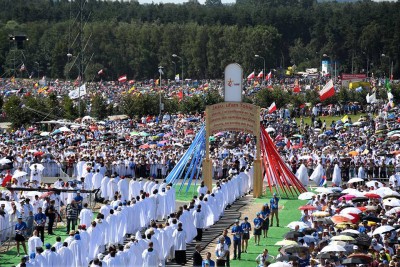
Aug 3, 2016 | Focolare Worldwide
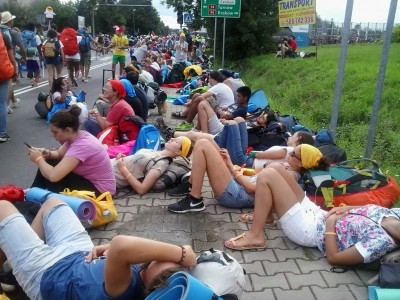 Anthony from the USA recounts: “Back in Chicago I’m used seeing everybody look out for themselves, without concern for others. As we made our way to the Field of Mercy someone came out of their house and offered us a tray of ice-cream . . . Another person gave water . . . I couldn’t believe my eyes!” Antonel is a Hungarian from Romania: “Although I live in Romania, I don’t speak much Romanian and have little contact with Romanians. The fact is, we feel that we’re Hungarians, not Romanians. We were in a group with both Romanians and Hungarians and it was just incredible. I learned more Romanian in those few days than I had in my entire life. I felt that we were real brothers and sisters. So many preujudices disappeared!” Anna from Italy: “Our luggage was quite heavy and a family invited us to go into their house. They offered to hold on to our luggage until the next day when we would be returning from the Field of Mercy. It seemed unreal. Then, when we returned they invited us in and offered us drinks and a bit of rest. We stayed with them for a while and then continued on. . .”
Anthony from the USA recounts: “Back in Chicago I’m used seeing everybody look out for themselves, without concern for others. As we made our way to the Field of Mercy someone came out of their house and offered us a tray of ice-cream . . . Another person gave water . . . I couldn’t believe my eyes!” Antonel is a Hungarian from Romania: “Although I live in Romania, I don’t speak much Romanian and have little contact with Romanians. The fact is, we feel that we’re Hungarians, not Romanians. We were in a group with both Romanians and Hungarians and it was just incredible. I learned more Romanian in those few days than I had in my entire life. I felt that we were real brothers and sisters. So many preujudices disappeared!” Anna from Italy: “Our luggage was quite heavy and a family invited us to go into their house. They offered to hold on to our luggage until the next day when we would be returning from the Field of Mercy. It seemed unreal. Then, when we returned they invited us in and offered us drinks and a bit of rest. We stayed with them for a while and then continued on. . .”  They were like an overflowing river . . . They had just arrived from Krakow after 10 hours of travelling. They were worn out but happy, filled with enthusiasm and determination. The Pope’s words entered deeply into their hearts. “We could say say WYD begins now and continues tomorrow at home, because that’s where Jesus wants to meet you from now on,” said Pope Francis at the Mass on the Field of Mercy. “The Lord doesn’t only wish only to remain in this city of fond memories, but to go to your homes and share in your everyday life: at school and your first years in the workplace, your friendships and your feelings, your plans and your dreams.” There were 600 young people from the Movement. Following the unforgettable experience at WYD they spent 5 days in Jasna on the Tatra Mountains in Slovakia.They wanted to make the Pope’s words become part of their lives and to discern together how to put them into practice in their lives. The Focolare young people were from 33 countries, from Australia to Brazil and Argentina, from Portugal to Russia. They say that they will never forget the experience of hospitality and brotherhood they experienced. The days ahead would be quite busy. The title chosen for their gathering was quite meaningful: “You God (got) me!” You’ve also swept us away, God. The gathering took place in the midst of the spectacular beauty of the Tarta Mountains and focused on three essential topics in the life of every human being: the relationship with God, the relationship with oneself and the relationship with others. The Pope’s words were the backdrop, along with the desire that no one take away their freedom to make courageous decisions to be “builders of the future”. The first day was spent telling stories about hospitality, helping one another, smiles, sharing – the Pope! They discussed his invitation to feel that Jesus calls them to leave their mark . . . a mark that marks history, that marks their story and the story of many others.” To not be “couch potatoes” but young people with their shoes laced, or better, with their hiking-boots laced. Domenico from the Cameroon summarized the sentiments of many: “A united world is possible, and we could reach universal brotherhood.” “As the Pope said, we should build bridges and reach out our hands to one another. I felt like judging so many countries that are creating wars in Africa, but as the Pope spoke I felt I had to change my way of thinking and begin to build those bridges. We reach brotherhood by building bridges; by hating we only destroy. Jesus allowed me to double my faith. Many times during my life I’ve wondered why there is so much suffering in the world, but now I realize that Jesus is there, that he becomes ugly in order to make everything beautiful. I’d like to be that way for others, to be active at building bridges. If we get our hands dirty, we’ll surely come to the point of living Jesus’s prayer to the Father: ‘that all be one’. Eva from Sovakia: “It struck us when the Pope blessed our dreams and our feet, giving significance to every effort we made.” “We have a lot of hard work ahead of us, but WYD shows that a new world is possible. It’s up to us to build it in the small steps that we take every day!” Pope Francis’s homily at WYD Mass, Mercy Field, July 31, 2016 Pope’s Address at WYD Prayer Vigil, July 30, 2016 Pope’s Words at WYD Way of the Cross
They were like an overflowing river . . . They had just arrived from Krakow after 10 hours of travelling. They were worn out but happy, filled with enthusiasm and determination. The Pope’s words entered deeply into their hearts. “We could say say WYD begins now and continues tomorrow at home, because that’s where Jesus wants to meet you from now on,” said Pope Francis at the Mass on the Field of Mercy. “The Lord doesn’t only wish only to remain in this city of fond memories, but to go to your homes and share in your everyday life: at school and your first years in the workplace, your friendships and your feelings, your plans and your dreams.” There were 600 young people from the Movement. Following the unforgettable experience at WYD they spent 5 days in Jasna on the Tatra Mountains in Slovakia.They wanted to make the Pope’s words become part of their lives and to discern together how to put them into practice in their lives. The Focolare young people were from 33 countries, from Australia to Brazil and Argentina, from Portugal to Russia. They say that they will never forget the experience of hospitality and brotherhood they experienced. The days ahead would be quite busy. The title chosen for their gathering was quite meaningful: “You God (got) me!” You’ve also swept us away, God. The gathering took place in the midst of the spectacular beauty of the Tarta Mountains and focused on three essential topics in the life of every human being: the relationship with God, the relationship with oneself and the relationship with others. The Pope’s words were the backdrop, along with the desire that no one take away their freedom to make courageous decisions to be “builders of the future”. The first day was spent telling stories about hospitality, helping one another, smiles, sharing – the Pope! They discussed his invitation to feel that Jesus calls them to leave their mark . . . a mark that marks history, that marks their story and the story of many others.” To not be “couch potatoes” but young people with their shoes laced, or better, with their hiking-boots laced. Domenico from the Cameroon summarized the sentiments of many: “A united world is possible, and we could reach universal brotherhood.” “As the Pope said, we should build bridges and reach out our hands to one another. I felt like judging so many countries that are creating wars in Africa, but as the Pope spoke I felt I had to change my way of thinking and begin to build those bridges. We reach brotherhood by building bridges; by hating we only destroy. Jesus allowed me to double my faith. Many times during my life I’ve wondered why there is so much suffering in the world, but now I realize that Jesus is there, that he becomes ugly in order to make everything beautiful. I’d like to be that way for others, to be active at building bridges. If we get our hands dirty, we’ll surely come to the point of living Jesus’s prayer to the Father: ‘that all be one’. Eva from Sovakia: “It struck us when the Pope blessed our dreams and our feet, giving significance to every effort we made.” “We have a lot of hard work ahead of us, but WYD shows that a new world is possible. It’s up to us to build it in the small steps that we take every day!” Pope Francis’s homily at WYD Mass, Mercy Field, July 31, 2016 Pope’s Address at WYD Prayer Vigil, July 30, 2016 Pope’s Words at WYD Way of the Cross
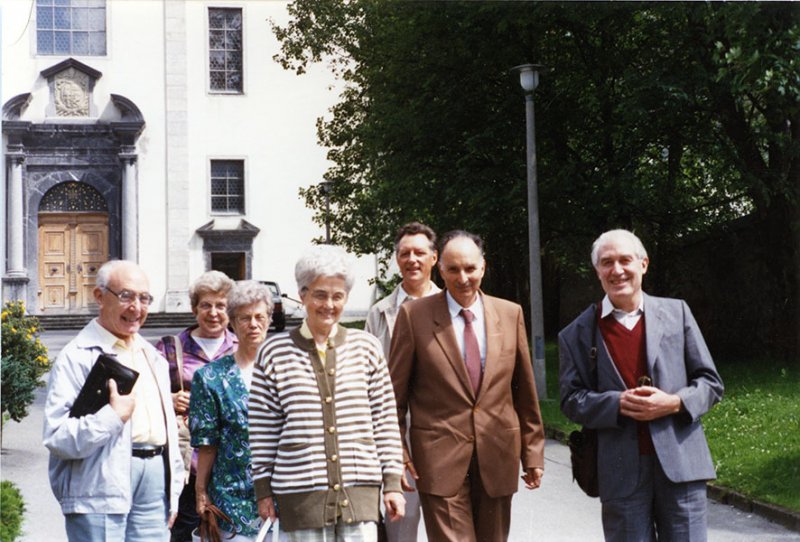
Aug 2, 2016 | Focolare Worldwide
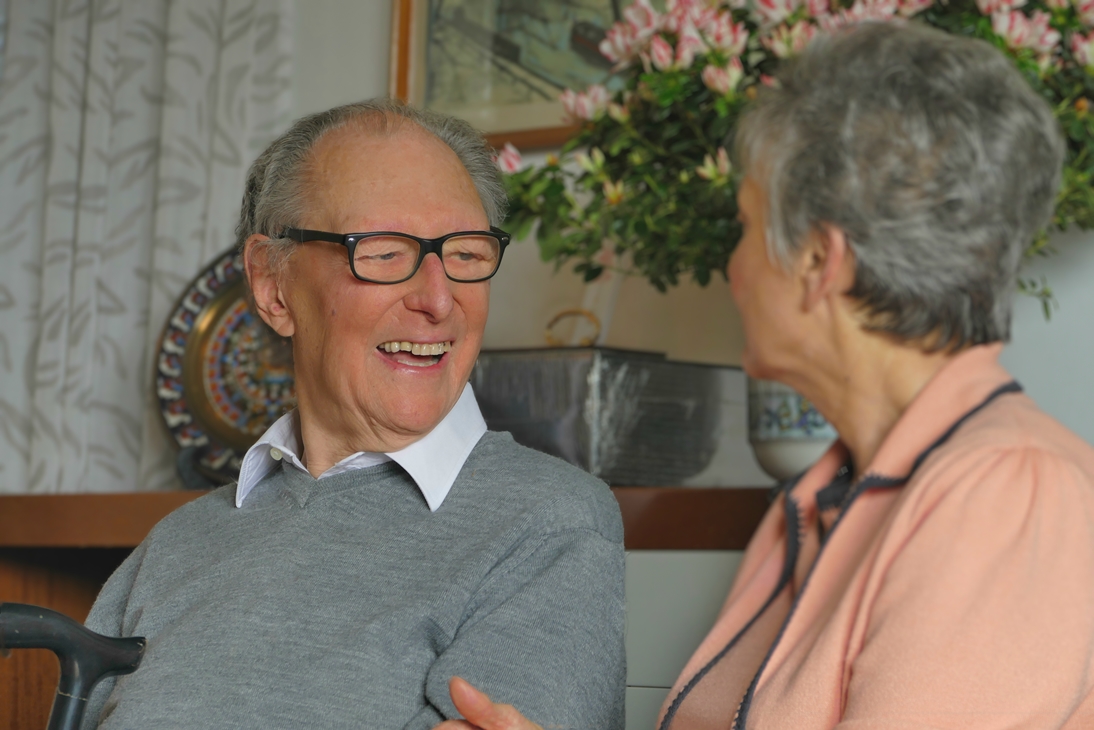 “He was for many a true testimony of God’s infinite mercy,” Maria Voce wrote to the members of the Movement, “which he now is certainly experiencing in fullness.” Born in Pistoia, on 8 September 1926, Bruno Venturini met the newly born Movement in December 1949, when, Graziella De Luca, one the first women focolarine, went to his city to meet Pasquale Foresi. He was ordained priest in 1978, and covered many roles in the Movement, but he would have later said that “one of the biggest graces I received was that of sharing the responsibility for the aspect of Economy and Work for over 30 years, with Giosi Guella, an exceptional person, and experience in person the constant Providence that made us feel totally in God’s hands.”
“He was for many a true testimony of God’s infinite mercy,” Maria Voce wrote to the members of the Movement, “which he now is certainly experiencing in fullness.” Born in Pistoia, on 8 September 1926, Bruno Venturini met the newly born Movement in December 1949, when, Graziella De Luca, one the first women focolarine, went to his city to meet Pasquale Foresi. He was ordained priest in 1978, and covered many roles in the Movement, but he would have later said that “one of the biggest graces I received was that of sharing the responsibility for the aspect of Economy and Work for over 30 years, with Giosi Guella, an exceptional person, and experience in person the constant Providence that made us feel totally in God’s hands.”

Bruno Venturini (third from right) was always close to Chiara Lubich.

 Every summer bishops from around the world gather for a preriod of rest and sharing of their lives while reflecting on being a Church that is instrument and sign of unity in the great variety of settings of the global society that is marked by so many tensions and contradictions. This year they met in Braga, Portugal. “In the Church today it is the moment of unity and communion, the moment when we are being invited to have a collective experience of God. We’re not here only because we’re each bishops, but because we’re brothers. We’d like to be a body of brothers like the first Apostles with Jesus.” These words were spoken by Cardinal João Bráz de Aviz during their Mass inside the Chapel of Apparitions as the 67 bishops from 27 countries made a pilgrimage to Fatima on August 4th.
Every summer bishops from around the world gather for a preriod of rest and sharing of their lives while reflecting on being a Church that is instrument and sign of unity in the great variety of settings of the global society that is marked by so many tensions and contradictions. This year they met in Braga, Portugal. “In the Church today it is the moment of unity and communion, the moment when we are being invited to have a collective experience of God. We’re not here only because we’re each bishops, but because we’re brothers. We’d like to be a body of brothers like the first Apostles with Jesus.” These words were spoken by Cardinal João Bráz de Aviz during their Mass inside the Chapel of Apparitions as the 67 bishops from 27 countries made a pilgrimage to Fatima on August 4th.  At the conclusion of the gathering Cardinal Francis Xavier Kriengsak Kovithavanij, Archbishop of Bangkok, Thailand summarized their experience in the following way: “We were really happy during these days. We’ve lived like brothers. We felt free and able to open our hearts to one another. Our only Teacher was truly among us. We felt that we were living in the house of Mary.” The bishops were welcomed at Mater Ecclesia Apostolic Centre near the Shrine of Our Lady of Sameiro, by Dom Jorge Ortiga, Archbishop of Braga. It was an appropriate setting for reflecting on the current world scene with international political expert Pasquale Ferrara, and the reform of the Church in the wake of Pope Francis with theologian Piero Coda. It was against this background that the bishops questioned themselves on how to be bishops with a synodal approach and put into practice a culture of shepherding that is marked by communion.
At the conclusion of the gathering Cardinal Francis Xavier Kriengsak Kovithavanij, Archbishop of Bangkok, Thailand summarized their experience in the following way: “We were really happy during these days. We’ve lived like brothers. We felt free and able to open our hearts to one another. Our only Teacher was truly among us. We felt that we were living in the house of Mary.” The bishops were welcomed at Mater Ecclesia Apostolic Centre near the Shrine of Our Lady of Sameiro, by Dom Jorge Ortiga, Archbishop of Braga. It was an appropriate setting for reflecting on the current world scene with international political expert Pasquale Ferrara, and the reform of the Church in the wake of Pope Francis with theologian Piero Coda. It was against this background that the bishops questioned themselves on how to be bishops with a synodal approach and put into practice a culture of shepherding that is marked by communion.  Plenary and small group meetings, walks and meals together were all opportunities to put in common painful situations and signs of hope: the anguished cry that rises from the Church in the Middle East; the growth of fruitful integration between basic ecclesial communities and new Movements and Communities in a large diocese of Brazil that offers a significant example of the Letter Iuvenescit Ecclesia (The Church that Rejuvinates), which was published in June by the Congregation for the Doctrine of the Faith; the challenges and potential of inculturation in a pluralistic context like India; the fruits that can come forth when a bishop and his auxiliaries live the common life and when a bishop manages to make himself a brother and friend of his priests; the arduous task of evangelization in a place like Madagascar that is marked by poverty.
Plenary and small group meetings, walks and meals together were all opportunities to put in common painful situations and signs of hope: the anguished cry that rises from the Church in the Middle East; the growth of fruitful integration between basic ecclesial communities and new Movements and Communities in a large diocese of Brazil that offers a significant example of the Letter Iuvenescit Ecclesia (The Church that Rejuvinates), which was published in June by the Congregation for the Doctrine of the Faith; the challenges and potential of inculturation in a pluralistic context like India; the fruits that can come forth when a bishop and his auxiliaries live the common life and when a bishop manages to make himself a brother and friend of his priests; the arduous task of evangelization in a place like Madagascar that is marked by poverty.  The two-day visit by bishops from other Churches – two Lutherans and one Syro-Orthodox – and an afternnon meeting with seven bishops from Portugal was mutually enriching. The spiritual part of the meeting had two main themes: Christ Crucified, which is one of the carindal points of the spirituality of unity; and love for the Church. These were presented in talks by Focolare president, Maria Voce (Jesus Forsaken, God’s Window & Humanity’s Window); and by co-president Jesús Morán (The Ecclesial Genius of Chiara Lubich and the Charism of Unity).
The two-day visit by bishops from other Churches – two Lutherans and one Syro-Orthodox – and an afternnon meeting with seven bishops from Portugal was mutually enriching. The spiritual part of the meeting had two main themes: Christ Crucified, which is one of the carindal points of the spirituality of unity; and love for the Church. These were presented in talks by Focolare president, Maria Voce (Jesus Forsaken, God’s Window & Humanity’s Window); and by co-president Jesús Morán (The Ecclesial Genius of Chiara Lubich and the Charism of Unity).





 «These have been wonderful days, I found peace and security. The group dialogues were rich, especially those of the families.» «I thank God for the grace we have received also as a couple. There were some issues between the two of us, but here, many things changed. Now we are happy and ready to commit ourselves to any type of activities.» « For the first time I helped out with the children: a very special experience. From them I learned simplicity and how to live love in daily life.» «I felt that I had to accept the others as they are. I have refilled and am ready to go forward!» These are some impressions, among many that have come up during these months throughout the world where the
«These have been wonderful days, I found peace and security. The group dialogues were rich, especially those of the families.» «I thank God for the grace we have received also as a couple. There were some issues between the two of us, but here, many things changed. Now we are happy and ready to commit ourselves to any type of activities.» « For the first time I helped out with the children: a very special experience. From them I learned simplicity and how to live love in daily life.» «I felt that I had to accept the others as they are. I have refilled and am ready to go forward!» These are some impressions, among many that have come up during these months throughout the world where the 


 “He was for many a true testimony of God’s infinite mercy,”
“He was for many a true testimony of God’s infinite mercy,”